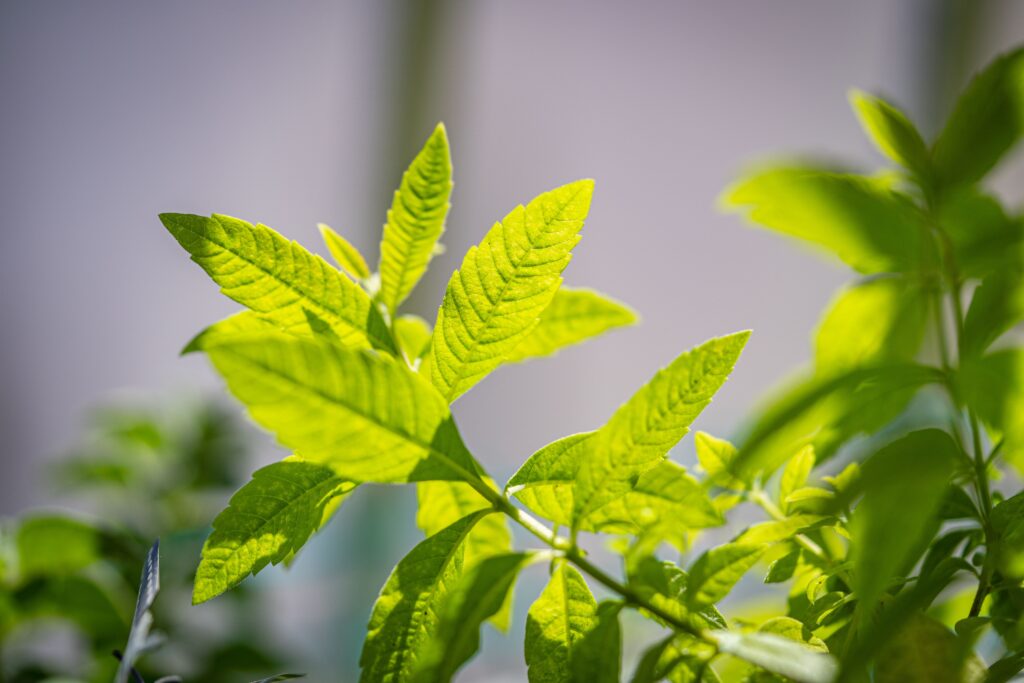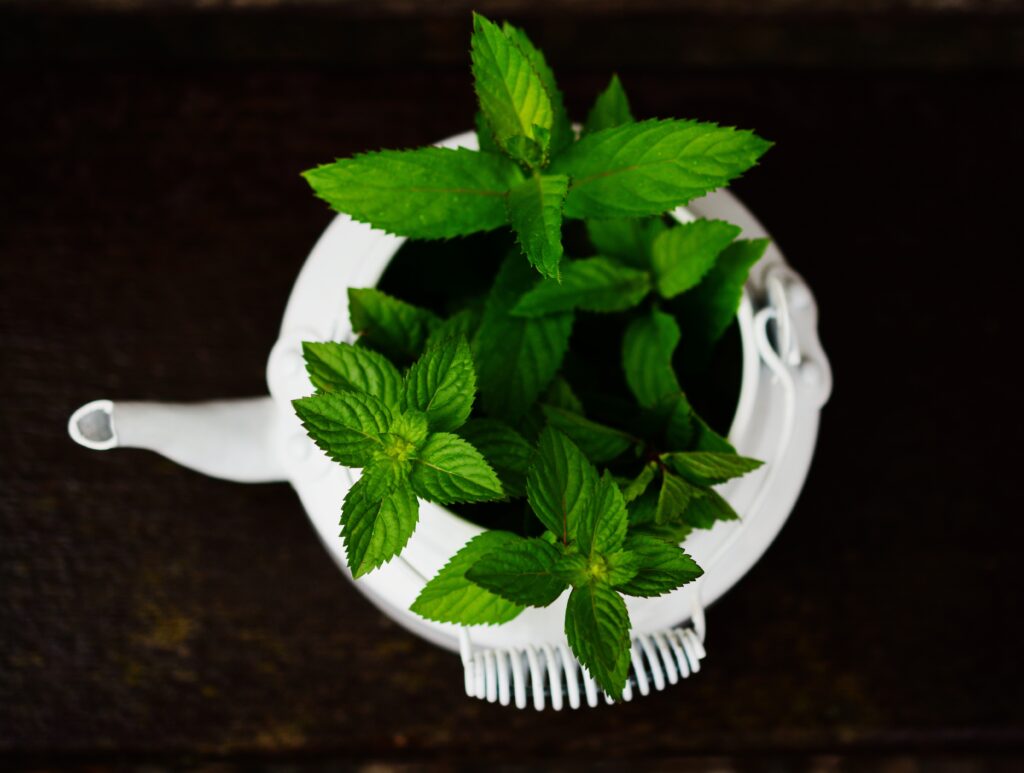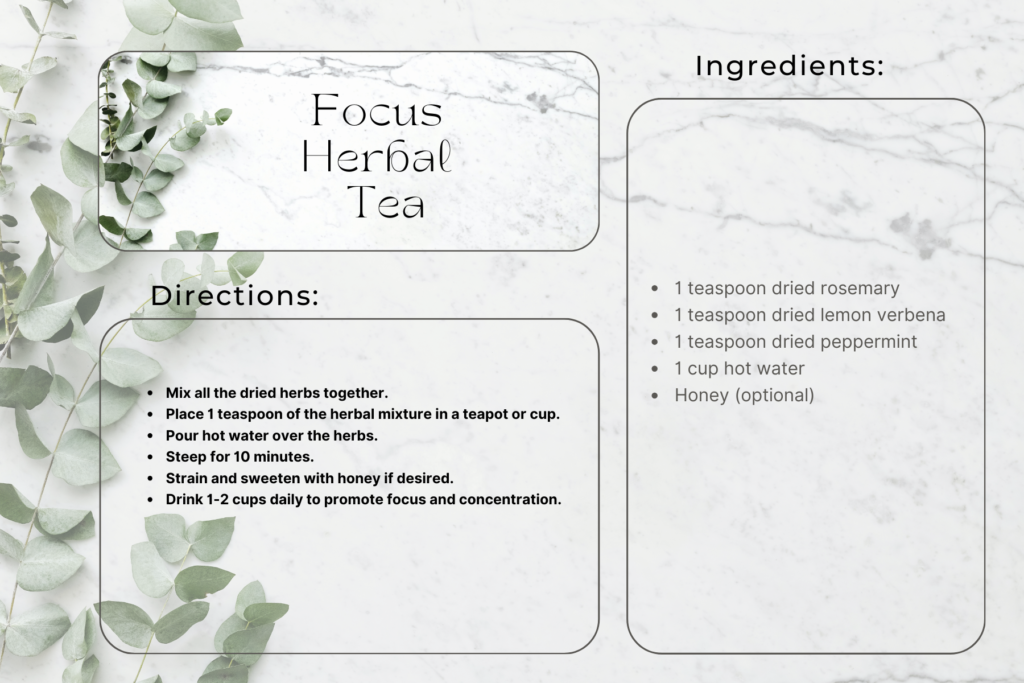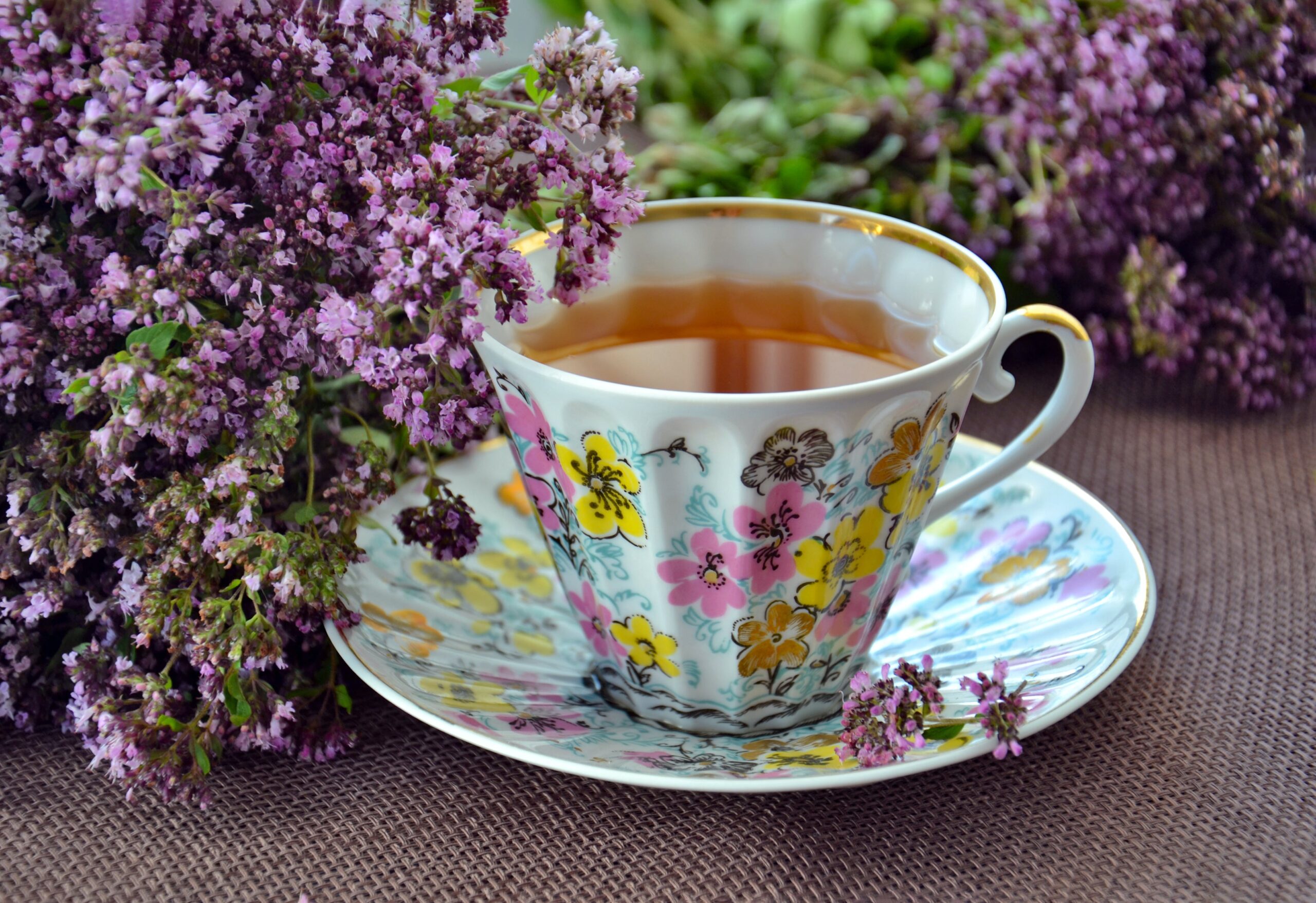The “Focus Herbal Tea” recipe combines three distinct herbs—rosemary, lemon verbena and peppermint—that collectively offer potential benefits for individuals with ADHD, bipolar disorder and/or rejection sensitive dysphoria:
- Rosemary: Rosemary is known for its cognitive-enhancing properties. It contains compounds that may increase the availability of acetylcholine, a neurotransmitter important for memory and cognitive function. For individuals with ADHD, rosemary might aid in attention and focus, potentially supporting improved concentration and mental clarity.
- Lemon Verbena: Lemon verbena is valued for its calming and mood-enhancing effects. It contains antioxidants that may help reduce oxidative stress and promote overall well-being. For individuals with bipolar disorder, lemon verbena’s potential mood-stabilizing properties could contribute to emotional balance and a more positive outlook.
- Peppermint: Peppermint is known for its refreshing aroma and digestive benefits. It may help alleviate gastrointestinal discomfort, which is often linked to emotional distress in conditions like rejection sensitive dysphoria. By supporting digestive health, peppermint can indirectly contribute to improved emotional well-being.
Focus Herbal Tea
Ingredients:
- 1 teaspoon dried rosemary
- 1 teaspoon dried lemon verbena
- 1 teaspoon dried peppermint
- 1 cup hot water
- Honey (optional)
Steeping Medicinal Concoctions
The history of steeping blended herbs into medicinal concoctions dates back centuries and spans across various cultures. This practice is deeply rooted in traditional herbal medicine, where different herbs, plants and botanicals were carefully combined and steeped to extract their therapeutic properties. Here’s a brief overview of the historical context:
- Ancient Civilizations:
- Herbal infusions and decoctions have been used in ancient civilizations such as Egypt, China, and Mesopotamia. These cultures recognized the healing properties of certain plants and developed methods to extract medicinal compounds through steeping.
- Traditional Chinese Medicine (TCM):
- In TCM, herbal teas and decoctions have been integral to healing practices for thousands of years. The Chinese pharmacopoeia includes a vast array of herbs, each with specific properties, and combinations were carefully crafted to address various health concerns.
- Ayurveda:
- Ayurvedic medicine, originating in ancient India, also emphasizes the use of herbal infusions. The Ayurvedic tradition involves blending herbs based on the individual’s constitution or dosha to restore balance and promote well-being.
- Middle Ages in Europe:
- During the Middle Ages in Europe, monasteries played a significant role in preserving and advancing herbal knowledge. Monks cultivated medicinal gardens and developed herbal remedies, often in the form of infusions and decoctions.
- Renaissance Period:
- The Renaissance saw a revival of interest in herbalism and the exploration of botanical remedies. Physicians and herbalists compiled extensive herbals, detailing the uses and preparations of various plants.
- Indigenous Healing Practices:
- Indigenous cultures worldwide have a rich tradition of using steeped herbs for medicinal purposes. Native American, African, and Australian Indigenous peoples, among others, have their unique herbal traditions.
- 19th and 20th Centuries:
- As scientific understanding of plants and their constituents advanced, herbal medicine continued to be practiced. However, the rise of pharmaceutical drugs led to a decline in the popularity of herbal remedies in some Western societies.
- Contemporary Herbalism:
- In recent decades, there has been a resurgence of interest in herbalism and natural remedies. People are exploring the benefits of steeping herbs for teas, infusions, and tinctures as part of holistic health practices.
Steeping Techniques:
- Infusions: Steeping herbs in hot water to extract flavors and medicinal compounds. This is commonly used for delicate parts of plants like leaves and flowers.
- Decoctions: Boiling tougher plant parts like roots, bark, or seeds to extract medicinal properties. This method is suitable for extracting compounds from hard or woody plant materials.
Today, the practice of steeping blended herbs is embraced by herbalists, naturopaths, and individuals seeking natural alternatives for health and wellness. While scientific research continues to explore the efficacy of herbal remedies, the historical use of steeped medicinal concoctions underscores the enduring value of botanical knowledge in promoting health.
Article Continues Below
Focus Herbal Tea
Read Our Affiliate Disclaimer
Focus Herbal Tea
Article Continues Below
Focus Herbal Tea
Instructions:
- Mix all the dried herbs together. (If you purchase in bulk, store in an air tight container.)
- Place 1 teaspoon of the herbal mixture in a teapot or cup.
- Pour hot water over the herbs.
- Steep for 10 minutes.
- Strain and sweeten with honey if desired.
Drink 1-2 cups daily to promote focus and concentration.
Experience the art of tea with the RORA Lazy Kungfu Glass Tea Set. Crafted from high-quality borosilicate glass, this set is perfect for blooming tea, ensuring both heat resistance and durability. The masterful design features a gooseneck non-drip water outlet for a smooth flow, preventing splashing. The automatic water injection system, facilitated by a removable infuser, simplifies the brewing process. With a firm grip handle and easy-to-clean design, this tea set is a blend of elegance and functionality. Embrace convenience and style while savoring the rich flavors of scented tea, loose leaf tea, or fruit tea. Check It Out!
Benefits of Focus Herbal Tea for Mental Disregulations
By blending these herbs into the “Focus Herbal Tea,” the recipe provides a combination of cognitive support, mood regulation and potential relief from physical discomfort. The act of sipping tea can also be soothing in itself, promoting a moment of mindfulness and relaxation. It’s important to note that individual responses to herbs can vary, and while these herbs may offer benefits, they should be considered as part of a comprehensive approach to mental well-being.

The Properties of Rosemary
Rosemary (Rosmarinus officinalis) possesses several beneficial properties that can positively impact mental health:
Cognitive Enhancement: Rosemary contains compounds that may enhance cognitive function. Its aroma, especially when inhaled, has been associated with improved memory, focus, and alertness. These effects can be particularly helpful for individuals with conditions like ADHD, supporting better attention and concentration.
Mood Elevation: The scent of rosemary has been linked to mood elevation and a reduction in anxiety. Inhalation of rosemary essential oil or exposure to its aroma through herbal teas and bath products can potentially enhance mood and alleviate feelings of stress.
Stress Reduction: Rosemary has adaptogenic properties, meaning it may help the body adapt to stress and mitigate its negative effects. By supporting the body’s stress response, rosemary can contribute to better mental resilience and emotional well-being.
Antioxidant Effects: Rosemary is rich in antioxidants, which can help protect brain cells from oxidative stress and inflammation. These effects are particularly relevant in disorders like bipolar disorder, where oxidative stress and inflammation play a role in symptom severity.
Neuroprotective Potential: Some research suggests that rosemary may have neuroprotective properties. Its compounds might support the health of brain cells and neuronal connections, potentially reducing the risk of neurodegenerative conditions and supporting overall cognitive health.
Anti-Anxiety Effects: Certain compounds in rosemary, such as rosmarinic acid, may have anxiolytic (anxiety-reducing) effects. Incorporating rosemary into your routine through aromatherapy or consumption might help alleviate feelings of anxiety and promote relaxation.
Aromatherapy Benefits: The practice of aromatherapy using rosemary essential oil can have direct effects on the brain through inhalation. This can result in improved mood, reduced stress, and enhanced mental clarity.
Inflammatory Regulation: Chronic inflammation has been linked to various mental health conditions. Rosemary’s anti-inflammatory properties could potentially contribute to the management of inflammation-related symptoms in conditions like bipolar disorder.

The Properties of Lemon Verbena
Lemon verbena (Aloysia citrodora) possesses several beneficial properties that can positively impact mental health:
Calming and Relaxation: Lemon verbena is known for its soothing properties. Its aroma has a calming effect on the nervous system and can help reduce feelings of anxiety and stress. This calming quality can contribute to overall emotional well-being and help manage symptoms associated with conditions like bipolar disorder and rejection sensitive dysphoria.
Mood Enhancement: The pleasant scent of lemon verbena has mood-enhancing effects. Inhaling its aroma can promote a more positive outlook, alleviate mood swings, and provide emotional comfort.
Sleep Aid: Adequate sleep is crucial for mental health. Lemon verbena’s calming properties can extend to promoting better sleep quality. Including lemon verbena in your routine, such as through herbal teas or aromatherapy before bedtime, may help improve sleep patterns.
Digestive Support: There is a strong gut-brain connection, and supporting digestive health can indirectly impact mental well-being. Lemon verbena has been traditionally used to soothe digestive discomfort, reduce bloating, and ease gastrointestinal distress, potentially alleviating some symptoms associated with rejection sensitive dysphoria.
Antioxidant Effects: Lemon verbena contains antioxidants that can help protect brain cells from oxidative stress and inflammation. These effects may play a role in reducing symptoms associated with bipolar disorder and other mood disorders.
Anti-Anxiety Properties: Lemon verbena’s natural compounds may have anti-anxiety effects. Consuming lemon verbena through teas or tinctures can contribute to a sense of relaxation and reduce anxiety symptoms.
Aromatherapy Benefits: The use of lemon verbena essential oil in aromatherapy can have direct effects on the brain through inhalation. Inhaling its aroma can help alleviate stress and anxiety, improve mood, and create a sense of calm.
Nutrient Content: Lemon verbena contains essential nutrients such as vitamins and minerals. These nutrients play a role in overall well-being and can contribute to maintaining a healthy mind and body.

The Properties of Peppermint
Peppermint (Mentha × piperita) possesses several beneficial properties that can positively impact mental health:
Stress Reduction: Peppermint has natural calming effects that can help reduce stress and anxiety. Its aroma and compounds like menthol can promote relaxation, making it useful for managing symptoms associated with ADHD, bipolar disorder, and rejection sensitive dysphoria.
Mood Enhancement: Inhaling the aroma of peppermint essential oil can have mood-enhancing effects. It can uplift the spirits, alleviate feelings of sadness, and promote a more positive mental state.
Focus and Alertness: Peppermint’s invigorating scent can help improve focus, concentration, and alertness. It can be particularly useful for individuals with ADHD, supporting better cognitive performance and attention.
Cognitive Clarity: The aroma of peppermint can stimulate the mind and promote cognitive clarity. It can help alleviate brain fog and mental fatigue, contributing to overall mental well-being.
Muscle Relaxation: Peppermint’s muscle-relaxing properties can extend to mental relaxation. Tension in the body is often linked to emotional stress. By promoting muscle relaxation, peppermint can indirectly help ease mental tension.
Digestive Support: Peppermint is known for its benefits in soothing digestive discomfort and reducing bloating. A calm digestive system can have positive effects on overall well-being, including mental comfort.
Aromatherapy Benefits: Aromatherapy using peppermint essential oil can have a direct impact on the brain through inhalation. Inhaling peppermint aroma can reduce feelings of stress, enhance mood, and improve mental clarity.
Energy Boost: Peppermint’s invigorating aroma can provide a natural energy boost. Increased energy levels can positively influence mental alertness and productivity.
It’s important to note that while peppermint offers these potential benefits, individual responses can vary. Incorporating peppermint into your mental wellness routine, along with other holistic practices, can contribute to positive outcomes. If you’re considering using peppermint supplements or essential oils, it’s advisable to consult with a healthcare professional, especially if you have existing health conditions or are taking medications. Additionally, while peppermint tea is generally safe, individuals with gastroesophageal reflux disease (GERD) or other digestive issues should exercise caution, as peppermint can relax the lower esophageal sphincter and worsen symptoms.
Cautions to Consider
Incorporating the “Focus Herbal Tea” into a holistic wellness program can offer potential benefits, but it’s essential to consider some cautions:
- Individual Reactions: Herbs can affect individuals differently. What works well for one person might not have the same effect on another. Start with a small amount of the tea and observe how your body responds before consuming larger quantities.
- Medication Interactions: Certain herbs can interact with medications. If you’re taking medications for ADHD, bipolar disorder, or other conditions, consult your healthcare provider to ensure there are no adverse interactions between the herbs and your medications.
- Allergies: Some individuals might be sensitive or allergic to certain herbs. Monitor for any allergic reactions such as skin rashes, itching, or digestive discomfort. If you have known allergies to any of the herbs used in the recipe, it’s best to avoid the tea.
- Pregnancy and Breastfeeding: Pregnant or breastfeeding individuals should exercise caution with herbal teas. Some herbs may not be safe during these times. Consult with a healthcare professional before including new herbal remedies in your routine.
- Dosage and Frequency: While herbal teas are generally considered safe, excessive consumption might lead to unwanted effects. Follow the recommended dosage and frequency mentioned in the recipe, and avoid overconsumption.
- Sensitivity to Caffeine: Peppermint can contain a small amount of caffeine. If you’re sensitive to caffeine or need to avoid it due to your health condition, take this into consideration.
- Underlying Health Conditions: If you have underlying health conditions beyond ADHD, bipolar disorder, or rejection sensitive dysphoria, consult a healthcare professional before adding new elements to your wellness program.
- Consistency: Herbal teas are most effective as part of a consistent routine. Drinking the tea occasionally might not yield significant results. Consider incorporating it into your daily or weekly wellness practices.
- Holistic Approach: Remember that herbal teas are just one element of a holistic wellness program. To achieve comprehensive well-being, also focus on factors like balanced nutrition, regular exercise, sleep, stress management, and mental health support.
Note: It’s always wise to consult a healthcare professional before making significant changes to your wellness regimen, especially if you have specific health concerns or are taking medications. Your healthcare provider can provide personalized advice based on your individual health profile.
Disclaimer: The information and/or products mentioned in this article are provided as information resources only and are not to be used or relied on to diagnose, treat, cure or prevent any disease. The statements made in this article have not been evaluated by the Food and Drug Administration. Any products mentioned are not intended to diagnose, treat, cure, or prevent any disease, but rather to be considered as an informational resource only to encourage critical thinking and personal research. The information in this article is intended for educational purposes only. The information is not intended to replace medical advice offered by licensed medical physicians. Please consult your doctor or health care practitioner for any and all medical advice.









